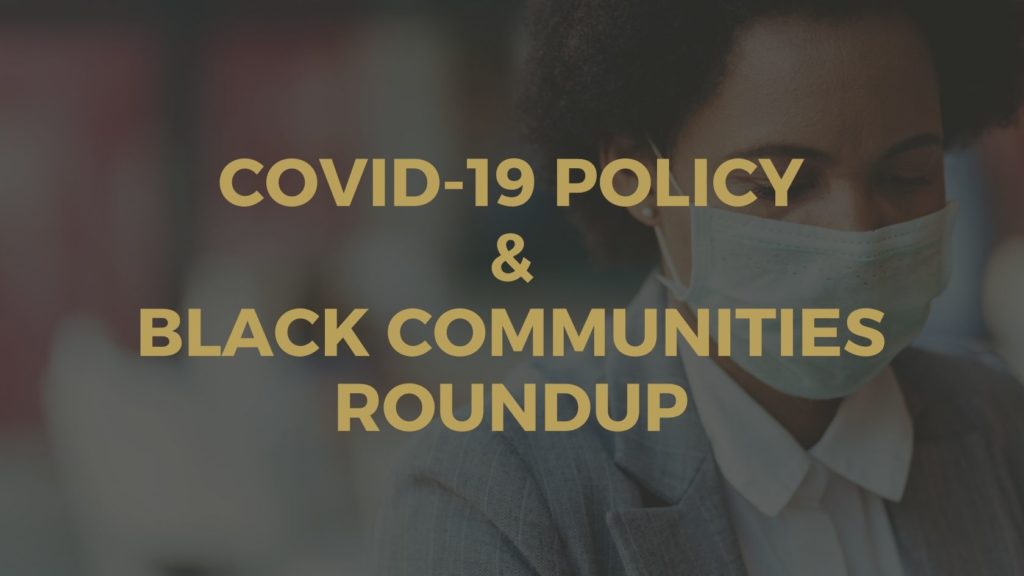
June 16 COVID-19 Policy & Black Communities Roundup
Democrats and Republicans Work on Policing Reform
After introducing a police reform bill at the beginning of last week, House Democrats held hearings on police reform, and expect to secure the 216 co-sponsors needed for passage of their reform package on the House floor (voting on the legislation is scheduled for June 25).
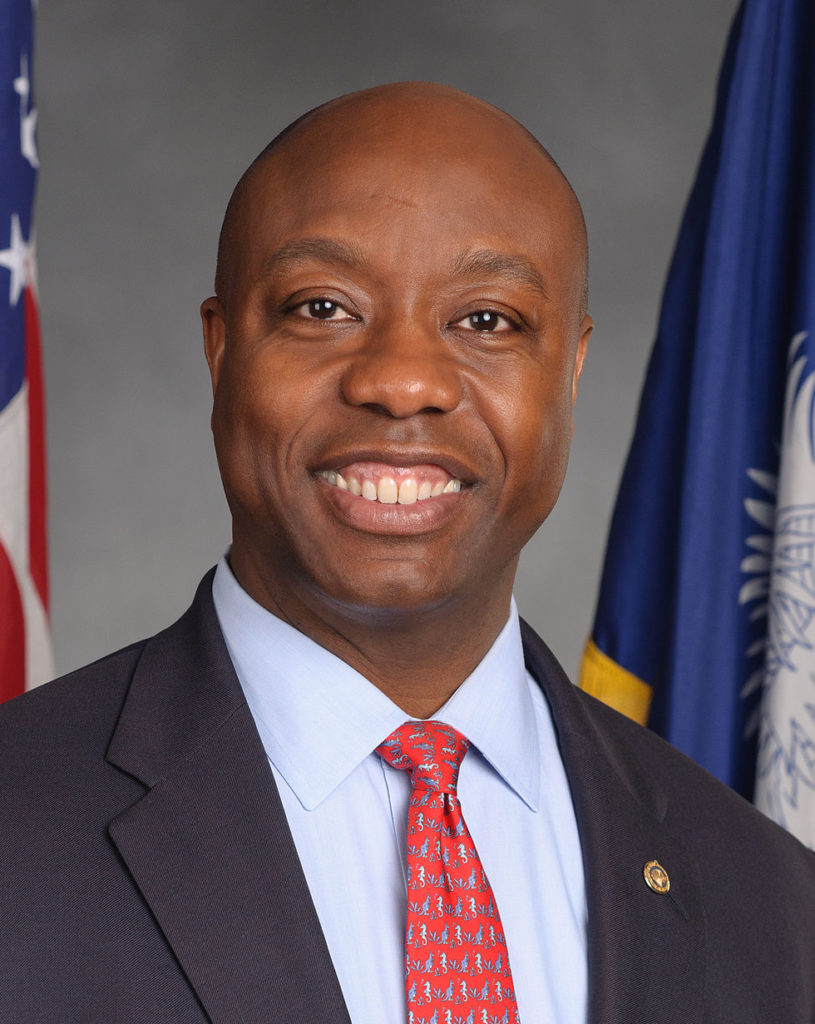
Senate Republicans appointed Senator Tim Scott (R-SC) to lead a group of GOP Senators tasked with proposing police reform legislation, and the GOP proposal is scheduled to be released on Wednesday. The proposal reportedly includes a chokehold ban, a no-knock warrants ban, better training in de-escalation, recruiting more Black police, mental health supports, and increased transparency (e.g., body cameras, police records, federal data collection on police use of force). While House Democrats want to lower barriers to bringing lawsuits against police who “‘recklessly’ violate civil rights” by modifying qualified immunity, Republicans view the provision as a “poison pill.”
Today President Trump signed an executive order on policing that is summed up by Business Insider with the following headline: “Trump’s executive order on policing is pro-police and doesn’t call for major changes.”
Democrats are also responding to calls to “defund” police by progressive activists and elected officials such as Congresswoman Ilhan Omar (D-MN). There is disagreement over whether defunding means reallocating resources to mental health professionals, social workers, and others with skills many police officers lack, or completely eliminating police funding.
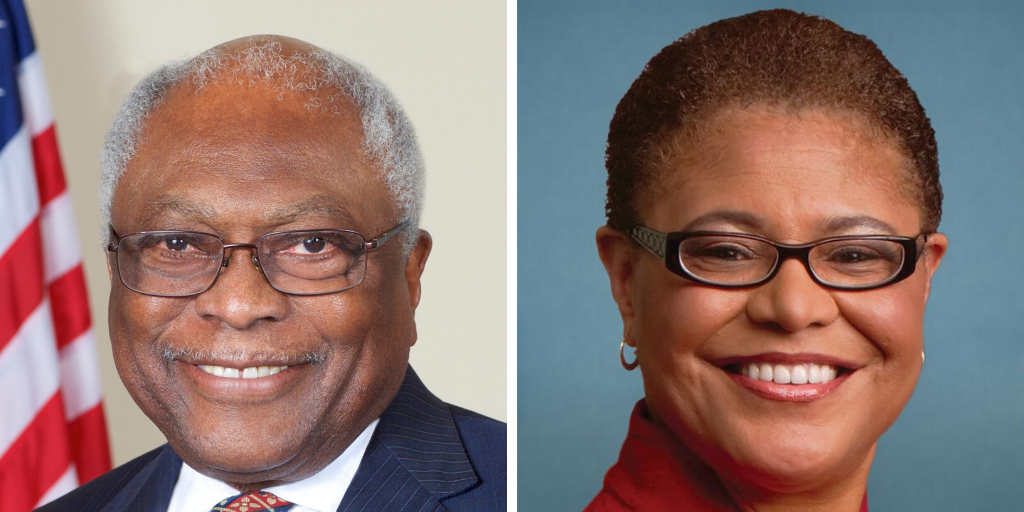
Leading Democrats—including House Majority Whip James Clyburn, Congressional Black Caucus Chair Karen Bass (D-CA), and other CBC members—are resisting defunding calls, citing the idea as a distraction from efforts to enact other police reforms. The CBC will host a virtual town hall on the proposed Justice in Policing Act on Friday.
A forthcoming economics paper that compares counties with police unions to those without police unions finds that after police officers became unionized, a substantial increase in the killing of civilians (largely nonwhite civilians) occurred, without a substantial increase in police officer safety.
Status of Next Coronavirus Stimulus Still in Limbo
The GOP and White House officials have decided to delay negotiations on a new round of coronavirus stimulus legislation until July 21, when Congress returns from recess and only days before several key provisions of the CARES Act—including the extended $600-per-week unemployment benefit and the federal moratorium on certain evictions—are set to expire. Republican leaders cited a need to delay discussing the additional stimulus package until the impact of past coronavirus relief package on the economy can be fully realized and money from those previous bills has been spent.
The Trump administration has indicated that it would like to see a $2 trillion stimulus package, while Senate Majority Leader McConnell has emphasized the need for a smaller stimulus package. The U.S. House of Representatives passed a $3 trillion package (the HEROES Act) in May.
Responding to demands from health leaders, the Trump administration announced how $25 billion in Medicaid payments from COVID-19 response legislation will begin to be distributed to eligible providers serving low-income patients during the pandemic.
In testimony before the Senate Small Business and Entrepreneurship Committee, Treasury Secretary Steven Mnuchin pointed to a need to incentivize businesses to accelerate rehiring people who lost jobs due to the pandemic, as part of the next round of coronavirus relief funding. Mnuchin also indicated support for more Paycheck Protection Program loans for small businesses. Of the total $660 billion allocated as Paycheck Protection Program Funds, as of June 15, $512.6 billion in loans had been distributed and the average loan size was $111,667.
Democrats Demand Data on Small Business Bailout
Majority Whip James E. Clyburn and the Democratic Members of the Select Committee on the Coronavirus Crisis requested documentation on funds disbursed under the Paycheck Protection Program. This investigation follows testimony from Treasury Secretary Mnuchin calling PPP borrower data “proprietary” and “confidential.”
According to the Atlantic Council, “creditworthy Black-owned firms face ongoing challenges—relative to similar white-owned firms in terms of profitability, credit risk, and other factors, Black-owned businesses that applied for financing were 20 percent and 17 percent less likely to do so at large and small banks respectively.” The decline in black business ownership (41% decline compared to a 22% decline of all US businesses owners between Feb. and Apr.) and other economic indicators illustrate the challenges for African Americans post COVID-19.
Georgia Voting Debacle Raises Concerns for November
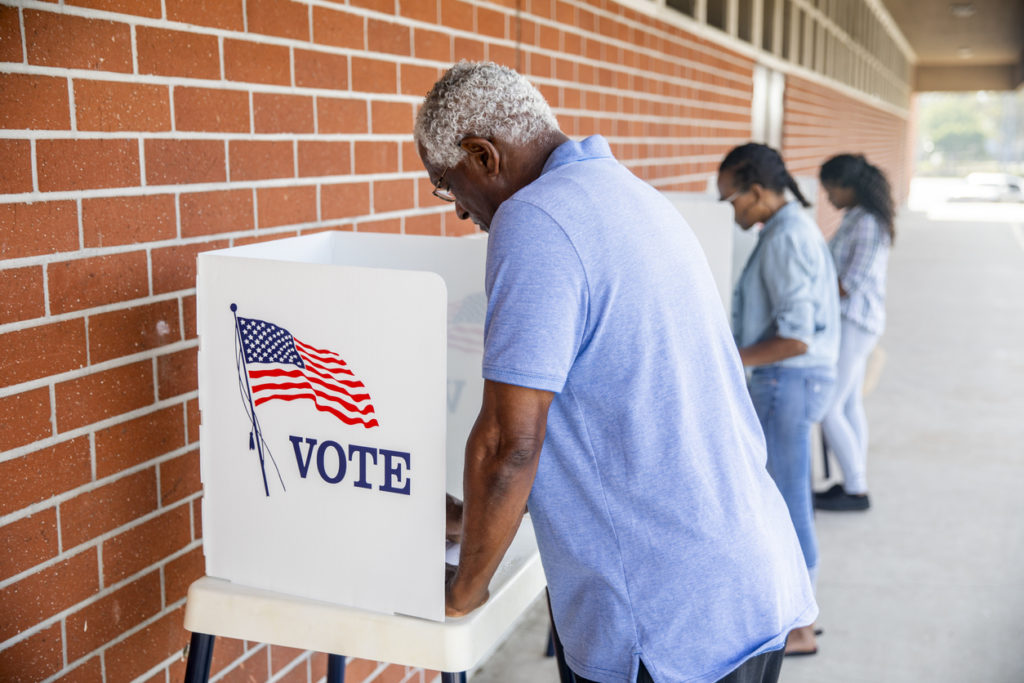
Last week during Georgia’s primary elections, areas with predominantly Black populations were plagued with voting issues ranging from failed voting machines to long lines. These disparate voting issues gave Georgia Democrats concern that the state’s Republicans are purposely trying to suppress votes (See The Hill and CNN). In certain jurisdictions, such as the Atlanta suburb Union City (which is 88% Black), voters waited until after midnight to cast a vote.
Black Voters Matter Co-Founder Cliff Albright told Politico that “a lot of black voters want to cast their ballots in person, to see it go into the ballot box because they don’t trust the mail.” Despite Black voters’ wariness of vote-by-mail, many may opt to vote-by-mail because of fear of getting COVID-19. In fact, a POLITICO/Morning Consult poll demonstrated that 54% of Black voters would prefer to vote-by-mail during the pandemic, as compared to 28% of Black voters who said they would still go to the polling station in-person. In comparison, 49% of white voters would prefer to vote-by-mail during the pandemic, while 44% prefer voting in-person during a pandemic.
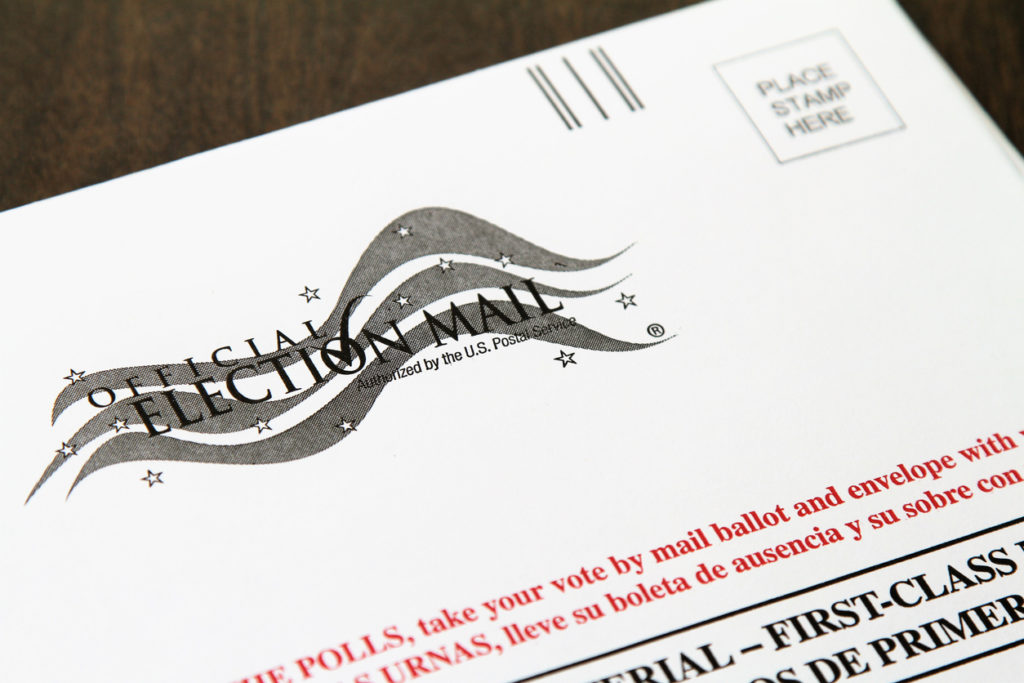
Georgia rescheduled their election twice since March due to COVID-19 concerns but still faced severe voting problems, shedding light on the need for more funding to equip polling sites and prepare for mail-in voting. Senator Kamala Harris (D-CA) and Rep. Marcia Fudge (D-OH) have legislation that allocates $5 billion to ensure accessible vote-by-mail, safe in-person voting options, and other voting reforms.
Other states that had voting issues last week were South Carolina where voters had long wait times, and Nevada, which had 98% of its votes cast by mail or drop-off location but still had complaints of long lines and too few polling sites. In 2016, the Joint Center published Reducing Long Lines to Vote, a policy brief providing recommendations to reduce extended wait times for voting.
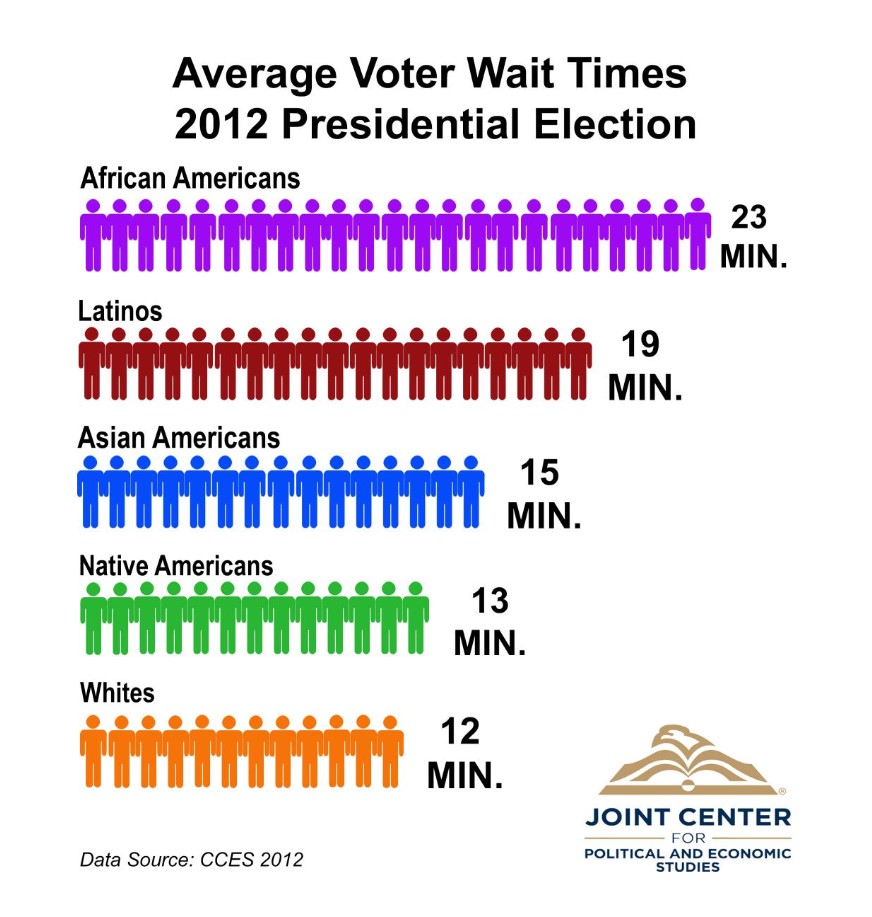
Economic Studies & COVID-19
Unemployment numbers remain high with more than 1.5 million claims filed the week ending June 6. Over 700,000 claims were filed for Pandemic Unemployment Assistance, which is offered to self-employed workers and others who are not traditionally eligible to receive unemployment insurance. The highest number of claims filed in a single-week prior to the pandemic was 695,000 in 1982. This week’s unemployment filings bring the total number of claims filed since the beginning of the pandemic to more than 44 million.
The Economic Policy Institute shared new and cumulative jobless claims by state, emphasizing that “Black communities are suffering more from this pandemic—both physically and economically—as a result of, and in addition to, systemic racism and violence.”
Noting that Black Americans have experienced higher unemployment rates during the pandemic (16.8% for Black Americans in May compared to 13.3% for all Americans), and Black workers are less likely to receive unemployment when unemployed, the Center on Budget and Policy Priorities provided evidence on why Congress should tie unemployment insurance extensions to the state of the labor market rather than to calendar dates as the economic downturn is likely to continue beyond this year. The Federal Reserve plans to leave interest rates near zero until 2022 on predictions that unemployment rates will remain high for more than a year. Economists Janelle Jones and Jared Bernstein argued that the Federal Reserve should target lowering the Black unemployment rate when setting monetary policy.
The Economic Policy Institute hosted a bipartisan panel of economists who urged policymakers to allocate federal aid for state and local governments or the “United States could end 2021 with 5.3 million fewer jobs, with losses in every state.”
ProPublica pointed out that Black communities, typically hit hard with garnishments from bill collectors, are still in jeopardy of having their wages seized during the pandemic since those collection practices have not been stymied.
The National Employment Law Project found that 19% of Black workers (compared to 9% of white workers) answered “‘yes’ or ‘maybe’ when asked if they or anyone at their company had been punished or fired for raising COVID safety concerns.” Additionally, three out of four Black workers reported that they have gone to work even though they were afraid of risking their health or the health of a family member.
The Center for American Progress evaluated data from the U.S. Census Bureau Household Pulse Survey identifying that 54% of Black households (compared to 43% of white households, 49% of Asian American households, and 63% of Latino households) “experienced a loss of employment income” since the coronavirus pandemic began in March.
Some studies show that Black college students and Historically Black Colleges and Universities (HBCUs) will be disproportionately impacted by COVID-19, further debilitating the path to wealth creation for Black communities.
Darren Walker, President of the Ford Foundation announced that the organizations’ Board of Trustees authorized up to $1 billion to strengthen and stabilize nonprofit organizations fighting against injustice and post COVID-19 recovery.
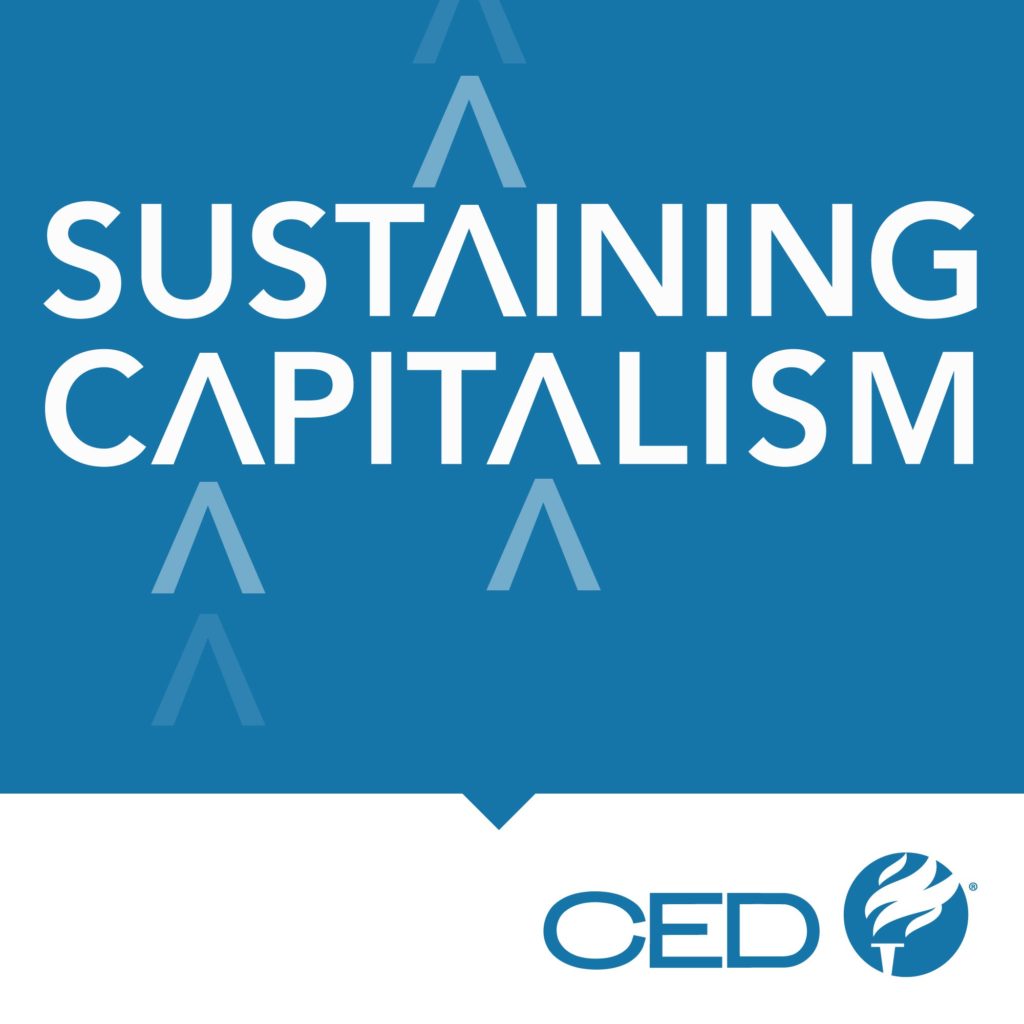
Joint Center Vice President Jessica Fulton joined The Committee for Economic Development and The Conference Board’s podcast, Sustaining Capitalism, to discuss COVID-19’s impact on Black communities.
Political Studies & COVID-19
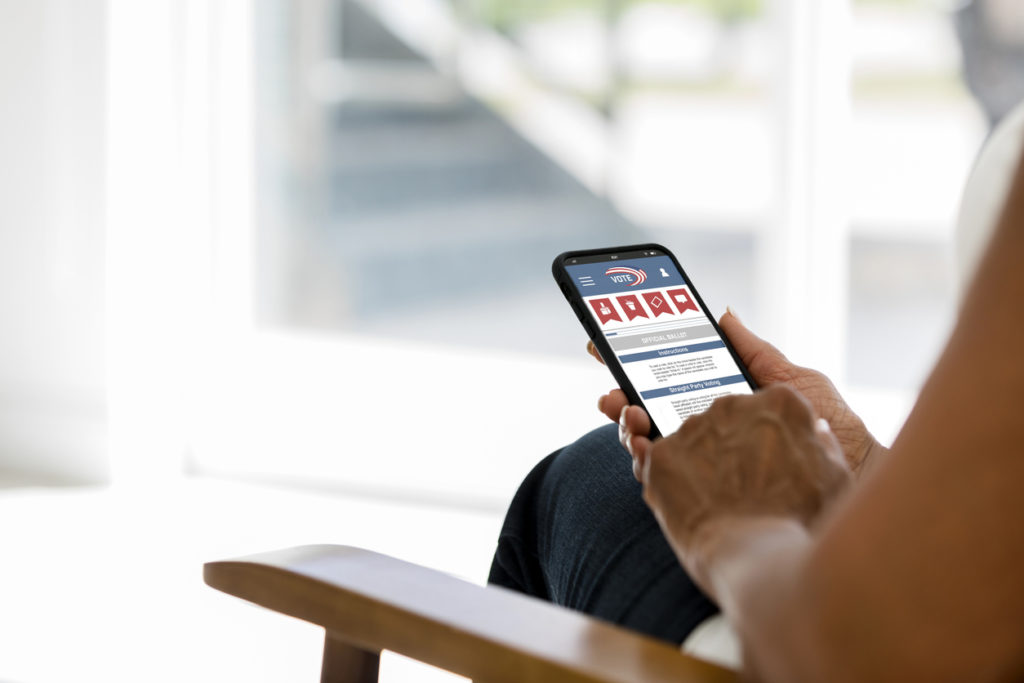
LeBron James is joining other NBA athletes to form More Than a Vote to protect voting rights and to encourage Black voter turnout. James told the New York Times that his organization will give tutorials on voting but also make people aware of “the other side,” referring to what is being done to stop people from voting.
West Virginia held online voting last week but some still have concerns over cybersecurity risks. Others debate whether online voting could be a viable alternative amidst COVID-19 concerns to traditional polling sites, as Delaware and other states gear up to implement online options for upcoming elections.
Organizing
The Urban Institute created a COVID-19 State and Local Resource Tracker that includes information on data and policy responses in areas critical to residents’ needs during this crisis.
NAACP Legal Defense and Education Fund, Inc. issued a statement addressing the voting delays in Georgia’s primary elections, emphasizing that safe, reliable, and accessible voting procedures are essential to our democracy.
The Advancement Project and New Georgia Project issued a statement condemning Governor Brian Kemp and Secretary of State Brad Raffensperger for their failure to make requested election improvements in response to COVID-19.
The Leadership Conference on Civil and Human Rights, The Lawyers’ Committee for Civil Rights Under Law, New America’s Open Technology Institute, and 83 civil rights, civil liberties, labor, and consumer protection organizations released principles to help protect the civil rights and privacy of persons as authorities consider strategies to reopen and release information technologies that can monitor, track, or trace individuals in response to COVID-19.
On Tuesday, June 9, Black Voters Matter visited polling locations in Georgia and recorded conversations with voters about conditions at polling places.
The National Black Caucus of State Legislators (NBCSL) called on governors to pre-position public health, public education, and economic recovery resources in vulnerable communities of color where the highest death rates have occurred from COVID-19.
Events

On June 16, Jessica will moderate Inequality in the Pandemic: Entrepreneurs of Color at Opportunity Finance Network’s Small Business Finance Forum. Presenters include U.S. Black Chambers President/CEO Ron Busby, National Association for Latino Community Asset Builders (NALCAB) Executive Director and CEO Noel Poyo, and Business Center for New Americans Founder and Executive Director Yanki Tshering.
On Juneteenth (June 19), Joint Center President Spencer Overton will speak on the From Pain to Protest to Policy panel at JusticeCon: A Path Towards Freedom on Juneteenth hosted by The Greater Allen A.M.E. Cathedral of New York. Other panelists include Prince George County Executive Angela Alsobrooks, Senator Kamala Harris (D-CA), Washington DC Chief Medical Examiner Dr. Roger Mitchell, and Kingdom Fellowship AME Church Executive Minister Rev. Matthew L. Watley.
Other upcoming events include “Supporting Women-Owned Businesses During the COVID-19 Era” (New America, June 16); “Incarceration, Homelessness, & COVID-19” (National Law Center on Homelessness and Poverty, June 17); “COVID-19 Demographic and Economic Resources Using Census Data” (United States Census Bureau, June 17); and Policy for the People: Water Justice in a Global Pandemic (Congressional Black Caucus Foundation, June 18).
Last weeks events were held by Black Communities: A Conference for Collaboration, Brookings, Congressional Black Caucus Foundation, Center for American Progress, Knight Foundation, NAACP, NAACP-Nashville Branch, NAACP Legal Defense and Education Fund, Inc., National Black Worker Project, New America, Politico, The Century Foundation, New York Times – The Daily, Third Way, U.S. Senate Committee on Health, Education, Labor & Pensions, UNCF, U.S. House Committee on Financial Services, and Washington Government Relations Group.
Community Organizations
Black to the Future Action Fund developed the Covid-19 Relief and Recovery Plan for Black America, a policy platform that demands relief for Black communities in healthcare, housing, democracy rights, and the economy.
MediaJustice Network hosted a series of conversations and workshops entitled Defend Our Movements in the time of Covid-19, to assist organizations and community organizers make prudent decisions to safeguard their online presence and safety.
On Juneteenth (June 19), Vote of the Experienced (VOTE) will gather peacefully at the Louisiana State Penitentiary to fight for the release of incarcerated individuals kept behind bars during the COVID-19 pandemic.
On June 18, SisterLove, Inc. will offer free COVID-19 and HIV testing in Atlanta.

